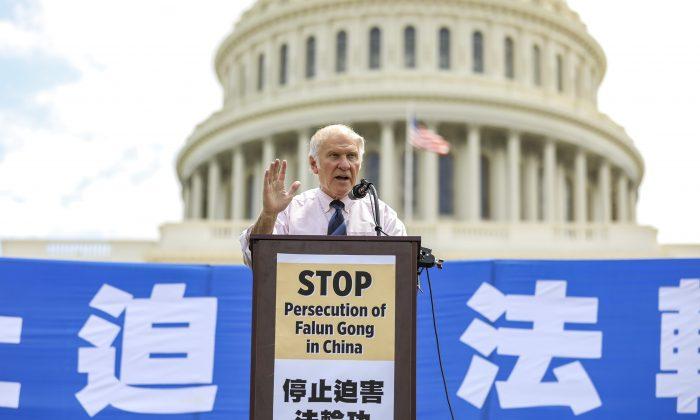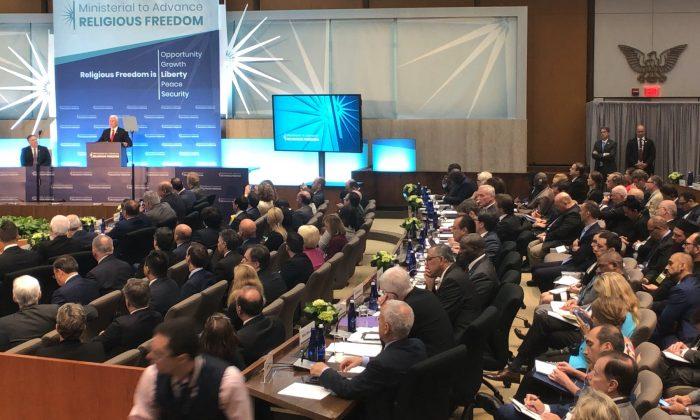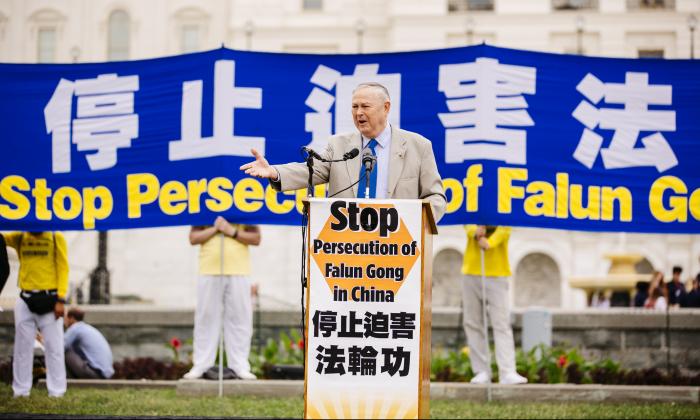The US-China Economic and Security Review Commission held a hearing last week to probe into the latest official statements from the regime concerning its national security policy. The Commission wanted to assess the “narrative” that the regime is releasing and compare how its words match with its deeds.
Co-chair Commissioner Dennis Shea summarized the disturbing nature of China’s latest actions.
“The Chinese [regime] insists that the People’s Liberation Army will only be used for defensive purposes, but year-on-year increases in its military budget, as well as a steady expansion of its capabilities for power projection, have generated cause for concern among many of China’s neighbors in East Asia.”
Ashley Esarey, from the Fairbank Center for Chinese Studies, Harvard University, also questioned the motivation for the military buildup “in the absence of a major threat to China’s national security.”
The old narrative was based upon Deng Xiaoping’s “low profile policy;” a strategy of appearing placid and disinterested in the outside world, while waiting until China’s power was strong enough to flout international norms. The time has come perhaps when the Deng philosophy of “don’t stick your head out” is being replaced by an assertive and nationalistic approach, said Christopher Ford, Hudson Institute.
China’s New Narrative Emerges in 2010
The tone of the hearing was decidedly pessimistic about the direction the narrative is taking and portends new problems for the bilateral relations between the United States and China.
Gilbert Rozman from Princeton University spoke specifically on China’s North Korean narrative because it displays better than any other, China’s new hostility to the West. He said that China has shifted from neutrality to a clear preference for North Korea’s position.
“The [new] narrative demonizes the United States. Compared to earlier Chinese writings, it places the entire responsibility on Washington for wrecking the six-party talks and taking a Cold War, ideological approach to North Korea,” said Rozman, adding that the CCP is accusing Washington of finding a willing partner in Seoul for its “destabilizing behavior.”
“Rather than criticizing the regime in Pyongyang for attacking and sinking the Cheonan [South Korean warship] or for shelling an island under the administration of South Korea, Beijing puts the onus on Washington for its dangerous escalation of tensions, such as military exercises in the Yellow Sea, supposedly directed against China,” said Rozman.
Read More...
Beijing’s role as peace mediator in the six-party talks in the Korean Peninsula is contradicted by its staunch, uncritical support for North Korea.
The demonization extends to vicious attacks on foreign leaders. President Barack Obama and Secretary of State Hillary Clinton are repeatedly criticized in the Chinese narrative.
“I have seen nothing like it in the treatment of prior U.S. leaders,” said Rozman.
Jacqueline Newmyer, president and CEO of the Long Term Strategy Group, provided a deeper analysis of the regime’s “information management”—a euphemism for propaganda—noting that Chinese officials craft different narratives for domestic and foreign audiences. The manipulation of message is more studied than most Americans realize, and is totally disingenuous, in her view.
For example, the “reassuring similarity” theme, Newmyer said is used to put others off guard. When China’s new advanced J-20 fighter was first flight tested on the same day of Secretary of Defense Robert Gates visit in Beijing, he was told that the test was conducted without Hu Jintao’s knowledge. It could easily be interpreted as a threat or snub, Newmyer said, but our anger was managed by Hu “invoking a bureaucratic or ‘civil-military’ breakdown of communication,” which might occur in any modern country.
In a written submission, Andrew Scobell from RAND Corporation, questioned Hu’s claim that he didn’t know about the test flight. But irrespective of whether or not there was civil-military coordination behind the scheduling, Scobell wrote that the episode raises “unsettling questions about the civil-military relations in China” and also challenges China’s “peaceful rise” narrative.
Either the military is spearheading a deceptive and coordinated strategy aimed at the United States, or at a minimum, the civilian control and oversight of the military is quite weak and parochial, wrote Scobell.
The belligerent “signaling” of the regime in this incident was picked up by Abraham Denmark, Center for a New American Security, who wrote that although he didn’t believe the timing was intentional by Hu, China’s Internet censors apparently allowed footage and discussion of the flight test to go forward during Gates visit “when they easily could have suppressed the story.”
More Openly Assertive
In the last year, the regime has claimed sovereignty over disputed territories in the Yellow, South China, and East China seas. This also signals a change in the regime’s articulation of its “core interests”—a designation intended to convey that the regime regards the issue as “off-limits for compromise or criticism,” said Mark Stokes, Project 2049 Institute.
Up until recently, Taiwan, Tibet, and Xinjiang were considered by Beijing to be “core interests” to its national sovereignty. Thus, arms sales to Taiwan—even if defensive in nature—and the Dalai Lama, have long been “sensitive” issues, that Beijing says the West needs to respect.
“Although China’s claims to the South China Sea go as far as the 1930s, the [People’s Liberation Army’s] declaration in late July 2010 that these waters now constitute a Chinese ‘core interest’ represented an alarming expansion of the definition of ‘core interests,’” said John Park, the United States Institute of Peace.
“China’s exercises and military presence in airspace and waters surrounding the disputed islands, previously rare and notable events, have become almost routine. China has also claimed sovereignty over almost the entirety of the South China Sea” said Denmark.
Based on these and other recent bellicose actions, the conclusion is almost inescapable that the People’s Liberation Army is becoming more influential in policy-making.




Friends Read Free